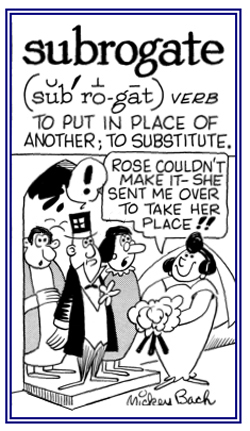rog-, roga-, -rogate, -rogation, -rogatory
(Latin: ask, inquire, request, beg; propose)
1. The act or process of questioning someone closely, often in an aggressive manner: The convicted murderer was under interrogation by the police detectives who were trying to determine what he did with the body of the victim.
Interrogations come in different settings and styles; such as, questionings, investigations, cross-examinations, or just simple inquiries.
2. A transmission of a signal to a computer, or the transmission of a signal to a device or computer program that triggers a response: The computer programmer was developing the interrogations that would provide the signals which would enhance the use of computers for users.
interrogative (adjective) (no comparatives)
1. Having a questionable look or seeming to be unsure what someone has said: Mrs. Richison, the police officer, had an interrogative expression on her face because she had doubts about the response the driver would provide when she asked him about what happened.
2. Consisting of, or used in, asking a question; such as, an interrogative pronoun:
2. Consisting of, or used in, asking a question; such as, an interrogative pronoun:
The five interrogative pronouns are "what", "which", "who", "whom", and "whose".
- What were you doing?
- Who said we couldn't do it?
- To whom were you speaking?
- Which meal did you like the best?
- Whose purse was left on the bus?
A word, a pronoun, or a phrase in a sentence or expression that is used to form an inquiry: There are some interrogative words that are often used to introduce questions; for example, "who", "what", and "where".
Who is your favorite author?
What did you say?
Where did Sally go?
interrogatively (adverb) (no comparatives)
1. In a questioning manner: Sam looked interrogatively at his wife when he heard a bump
outside his house at night.
2. In the form of a query: Sally interrogatively looked at her son as if asking if he had finished his homework.
2. In the form of a query: Sally interrogatively looked at her son as if asking if he had finished his homework.
An investigator who is usually harsh or excessively strong: The police interrogator asked Janice a lot of questions for a long time using threats in order to get the information which he thought she knew.
interrogatorily (adverb), more interrogatorily, most interrogatorily
A reference to requesting facts or asking for information: The clerk interrogatorily turned to the customer asking if there was anything else he could do to help her.
The mother interrogatorily looked at her son and asked how school was today.
1. A formal or written issue usually requiring an answer under oath; such as, that of a witness in a court trial: Judge Evans made several interrogatories of the witness after the lawyers had asked their questions.
2. A query or a series of queries: The job applicant completed the interrogatories that were indicated on the application form.
2. A query or a series of queries: The job applicant completed the interrogatories that were indicated on the application form.
interrogatory (adjective), more interrogatory, most interrogatory
A formal systematic inquiry; especially, a formal examination of a witness in a court of law: The lawyer, Mr. Younge, used interrogatory statements about what happened at the robbery in the store.
1. A right reserved exclusively by a particular person or group occupying a particular rank or position, especially a hereditary or official right: As president of the company, Mr. Smith felt that he had the prerogative of choosing the person who would replace him when he retired.
2. A privilege or right that allows a particular person or group to give orders or to make decisions and judgments: Well, if Tom would rather sell his football tickets instead of using them, that's his prerogative.
3. The right conferred by a natural advantage that places someone in a position of superiority: Getting a seat on a full bus is one of the prerogatives of being a senior citizen.
4. The power or right of a monarch or government to do something or to be exempt from something: Parking in normally restrictive areas in the city is a prerogative of Mayor Dawson's chauffeur.
5. Etymology: from Old French prerogative, Medieval Latin (about 700-1500) prerogativa, "special right"; from Latin prærogativa, "prerogative, previous choice or election"; originally (with tribus, centuria), "unit of 100 voters who by lot voted first in the Roman comita"; feminine of prærogativus, "chosen to vote first"; from prærogere, "to ask before others"; from præ-, "before" + rogare, "to ask".

© ALL rights are reserved.
Go to this Word A Day Revisited Index
2. A privilege or right that allows a particular person or group to give orders or to make decisions and judgments: Well, if Tom would rather sell his football tickets instead of using them, that's his prerogative.
3. The right conferred by a natural advantage that places someone in a position of superiority: Getting a seat on a full bus is one of the prerogatives of being a senior citizen.
4. The power or right of a monarch or government to do something or to be exempt from something: Parking in normally restrictive areas in the city is a prerogative of Mayor Dawson's chauffeur.
5. Etymology: from Old French prerogative, Medieval Latin (about 700-1500) prerogativa, "special right"; from Latin prærogativa, "prerogative, previous choice or election"; originally (with tribus, centuria), "unit of 100 voters who by lot voted first in the Roman comita"; feminine of prærogativus, "chosen to vote first"; from prærogere, "to ask before others"; from præ-, "before" + rogare, "to ask".

Go to this Word A Day Revisited Index
so you can see more of Mickey Bach's cartoons.
prorogate (verb), prorogates; prorogated; prorogating
1. To discontinue a session or meeting of a group: The premier decided to prorogate parliament until after the holiday season.
2. To postpone; to defer: Mr. Zachary asked the bank to prorogate the repayment of his bank loan until after he gets a new job.
2. To postpone; to defer: Mr. Zachary asked the bank to prorogate the repayment of his bank loan until after he gets a new job.
1. Discontinuing the meetings of a legislative body without dissolving it: Sometimes the prorogation of some government bodies take place for weeks or even months.
2. In England, the continuance of parliament from one session to another, as an adjournment is a continuance of the session from day to day: To avoid calling new elections, the prime minister decided on a prorogation of the government until after the summer holidays.
2. In England, the continuance of parliament from one session to another, as an adjournment is a continuance of the session from day to day: To avoid calling new elections, the prime minister decided on a prorogation of the government until after the summer holidays.
This is the established language with respect to the parliament of Great Britain. In the United States, the term prorogation is rarely or never used because "adjournment" is preferred.
prorogue (verb), prorogues; prorogued; proroguing
To defer something to a later date or to a subsequent meeting: The bank agreed that it would prorogue the company's bank loan for two months until a settlement was concluded.
1. A solemn supplication ceremony prescribed by a church: The pastor conduced the rogation as requested by his parishioners.
2. In the Christian Church, a solemn prayer or supplication; especially, one that is made as part of the observation of the three days preceding Ascension Day: Katherine requested that a special rogation in honor of her mother be said by the pastor.
3. In ancient Rome, the submission of a law by a consul, or tribune, to the people for their approval, or a law so submitted: The consul stood before the citizens and read the rogation, and then urged them to give their support.
4. Etymology: from Latin rogatio, rogationis, from rogatus, and rogare, "to ask".
2. In the Christian Church, a solemn prayer or supplication; especially, one that is made as part of the observation of the three days preceding Ascension Day: Katherine requested that a special rogation in honor of her mother be said by the pastor.
3. In ancient Rome, the submission of a law by a consul, or tribune, to the people for their approval, or a law so submitted: The consul stood before the citizens and read the rogation, and then urged them to give their support.
4. Etymology: from Latin rogatio, rogationis, from rogatus, and rogare, "to ask".
subrogate (verb), subrogates; subrogated; subrogating
1. To substitute a person for another one: Since Sean's daughter was in the hospital, he surrogated her, or took her place, to claim the lottery prize that she had won.
2. To substitute one creditor for another, as in a case where an insurance company sues the person who caused an accident in behalf of the insured: Legal action was taken to subrogate the ultimate payment of the debt by the party who, in fairness and good conscience, should pay for the damage that they caused.

© ALL rights are reserved.
Go to this Word A Day Revisited Index
2. To substitute one creditor for another, as in a case where an insurance company sues the person who caused an accident in behalf of the insured: Legal action was taken to subrogate the ultimate payment of the debt by the party who, in fairness and good conscience, should pay for the damage that they caused.

Go to this Word A Day Revisited Index
so you can see more of Mickey Bach's cartoons.
The substitution of one legal claim for another one: There was a subrogation that included a transfer of Norbert's payments of his debt to Tamika, after her death, to her daughter.


